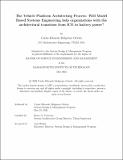The Vehicle Platform Architecting Process: Will Model Based Systems Engineering help organizations with the architectural transition from ICE to battery power?
Author(s)
Melgarejo Oviedo, Carlos Edoardo
DownloadThesis PDF (3.965Mb)
Advisor
Cameron, Bruce G.
Terms of use
Metadata
Show full item recordAbstract
The CO₂ emission reduction regulation set for automakers led them to develop BEVs on modified Internal Combustion Engine (ICE) platforms between the late 1990’s and early 2010’s. However, a long-term strategy to be competitive on range in the market demanded the development of BEV-dedicated platforms. Legacy OEMs (Toyota, VW, GM, and others), in theory, had deep process experience architecting vehicle platforms. The challenge from their perspective was to adapt that process to a new architecture and power source and to react to other recent technologies trending in the market. By contrast, the new market entrants (Tesla, Rivian, BYD, etc.) had almost no process experience but were unencumbered by compatibility with legacy platforms. The modules and software required to power BEVs make them more complex than ICEVs despite the fewer pieces in their powertrain. A series of interviews with Systems Engineering experts in the automotive industry were held to understand the differences in the architecting process between ICEs and BEVs. In the study, 45% of the interviewees claimed that BEVs are more challenging to architect than ICEVs, another 45% stated exactly the opposite, and the remaining 10% stated that the difficulty level is the same for both. Additionally, over 80% of the participants stated that an architectural change in a BEV is as smooth as in an ICEV. The study suggests that the architecting difficulty perception between ICEVs and BEVs is linked to the experience of the companies as well as some practices like module incompatibility tracking and key interface identification that happen during the architecting process.
Model-Based Systems Engineering (MBSE) is a methodology largely developed in the Aerospace industry, but which presents a potential solution for managing the increased complexity of BEV-dedicated platforms. During an MIT MBSE course, 5,379 professionals have been surveyed from 2017 to 2024. The data from these surveys was analyzed to identify trends in MBSE adoption over time. The study revealed that MBSE adoption has increased at a rate of 4.11% annually across several industries and has been used primarily for the transformation of processes and workflows. The MBSE implementation in the automotive industry is around 15% higher than in other sectors. However, it has not experienced growth over the past four years. The study also suggests that the main challenges to extending the MBSE adoption are the lack of guidelines and the low credibility of models. Nevertheless, survey respondents remain positive about this approach; between 60% and 70% of them think that their companies should implement MBSE, suggesting a future increase in its adoption and an important role of this methodology in managing new BEV-dedicated platforms' complexity.
Date issued
2024-05Department
System Design and Management Program.Publisher
Massachusetts Institute of Technology